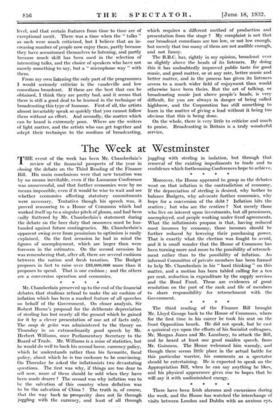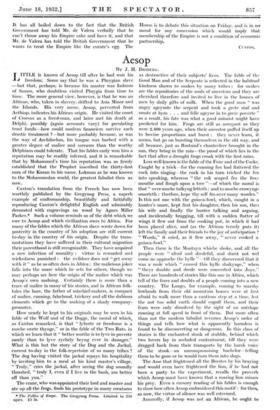The Week at Westminster
THE event of the week has been Mr. Chamberlain's review of the financial prospects of the year in closing the debate on the Third Reading of the Finance Bill. His main conclusions were that new taxation was by no means inevitable, even if the Lausanne Conference was unsuccessful, and that further economies were by no means impossible, even if it would be wise to wait and see whether economies affecting statutory commitments were necessary. Tentative though his speech was, it proved reassuring to a House of Commons which had worked itself up to a singular pitch of gloom, and had been Badly fluttered by Mr. Chamberlain's statement during the debate on the beer duty that resources must be hus- banded against future contingencies. Mr. Chamberlain's apparent swing over from pessimism to optimism is easily explained. On the first occasion he had in mind the figures of unemployment, which are larger than were foreseen in the estimates. On the second occasion he was remembering that, after all, there are several cushions between the nation and fresh taxation. The Budget proposes in fact to raise over £88,000,000 more than it proposes to spend. That is one cushion ; and the others are a conversion operation and economies.
* * * * Mr. Chamberlain preserved up to the end of the financial debates that studious refusal to make the air cushion of inflation which has been a marked feature of all speeches on behalf of the Government. On closer analysis, Sir Robert Home's proposal for the deliberate depreciation of sterling has lost nearly all the ground which he gained for it by a clever presentation of one set of facts only. The coup de grace was administered to the theory on Thursday in an extraordinarily good speech by Mr. Herbert Williams, once Parliamentary Secretary to the . Board of Trade. Mr. Williams is a mine of statistics, but he would do well to back his second horse, currency policy, which he understands rather than his favourite, fiscal policy, about which he is too cocksure to be convincing. On Thursday he asked the inflationists two devastating questions. The first was why, if things are too dear to sell now, more of them should be sold when they have been made dearer ? The second was why inflation was to be the salvation of this country when deflation was to be the salvation of China ? The truth is,_ of course, that the way back to prosperity does not lie through juggling with the currency, and least of all through juggling with sterling in isolation, but through that removal of the existing impediments to trade and to confidence which forthcoming Conferences hope to achieve.
'5 * * *
Moreover, the House appeared to grasp as the debates went on that inflation is the contradiction of economy. If the depreciation of sterling is desired, why bother to balance Budgets, why advocate further economies, why hope for a conversion of the debt ? Inflation hits the rentiers ; but who are the rentiers? Not merely those who live on interest upon investments, but all pensioners, unemployed, and people working under fixed agreements. What the inflationists propose is that, having reduced most incomes by economy, those incomes should be further reduced by lowering their purchasing power. That is exactly what the election was fought to avoid, and it is small wonder that the House of Commons has been turning more and more to the possibility of retrench- ment rather than to the possibility of inflation. An informal Committee of private members has been formed to help Mr. Chamberlain in his " hard thinking " on this matter, and a motion has been tabled calling for a ten per cent. reduction in expenditure by the supply-services and the Road Fund. These are evidences of great resolution on the part of the rank and file of members to share responsibility for retrenchment with the
Government. * * * *
The third reading of the Finance Bill brought Mr. Lloyd George back to the House of Commons, where for the first time in his career he took his seat on the front Opposition bench. He did not speak, but he cast a quizzical eye upon the efforts of his Socialist colleagues, Mr. Morgan Jones and Mr. Lansbury, to attack the Bill, and he heard at least one good maiden speech, from Mr. Guinness. The House welcomed him warmly, and though there seems little place in the actual battle for this particular warrior, his comments as a spectator should be entertaining. He is expected to speak on the Appropriation Bill, when he can say anything he likes, and his physical appearance gives rise to hopes that he will say it with undiminished energy.
* * * * There have been Irish alarums and excursions during the week, and 'the House has watched the interchange of visits between London and Dublin with an anxious eye.
It has all boiled down to the fact that the British Government has told Mr. de Valera verbally that he . can't throw away his Empire cake and have it, and that Mr. de Valera has told the British Government that he wants to treat the Empire like the curate's egg. The House is to debate this situation on Friday, and is in no mood for any concession which would imply that membership of the Empire is not a condition of economic partnership.
CUSTOS.









































 Previous page
Previous page